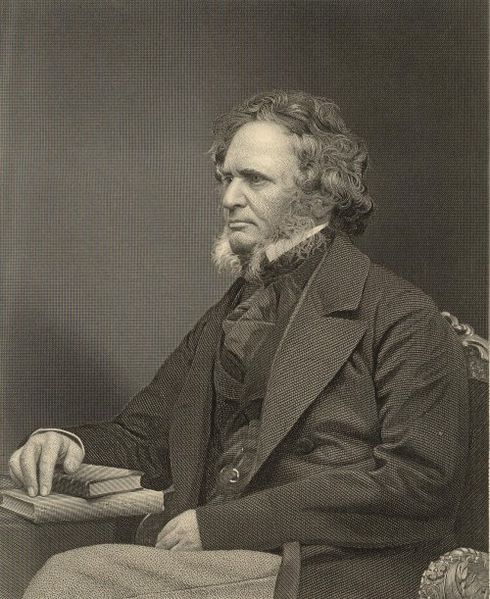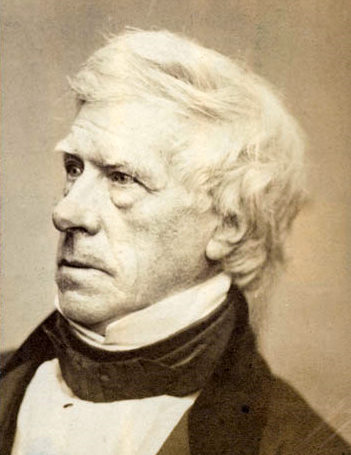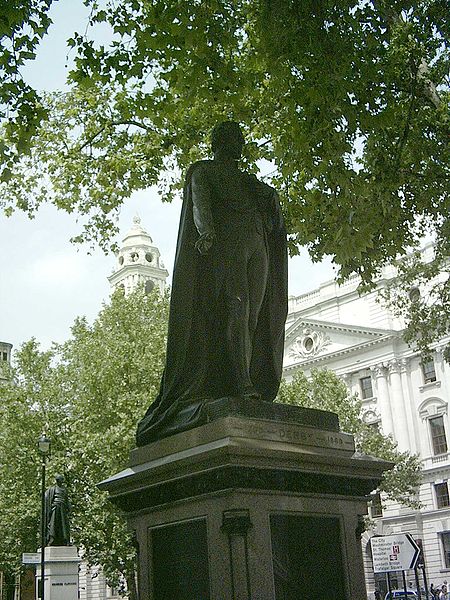<Back to Index>
- Mathematician Tullio Levi-Civita, 1873
- Architect Sir Edwin Landseer Lutyens, 1869
- Prime Minister of the United Kingdom Edward George Geoffrey Smith-Stanley, 1799



Edward George Geoffrey Smith-Stanley, 14th Earl of Derby, KG, PC (29 March 1799 – 23 October 1869) was an English statesman, three times Prime Minister of the United Kingdom, and to date the longest serving leader of the Conservative Party. He was known before 1834 as Edward Stanley, and from 1834 to 1851 as Lord Stanley. His record was unusual, since he is one of only four British Prime Ministers to have three or more separate periods in office. However his ministries all lasted less than two years, and he held the post for a total of just over four years, less than many other Prime Ministers.
Stanley was born to Edward Smith-Stanley, 13th Earl of Derby and Charlotte Margaret Hornby, daughter of Reverend Geoffrey Hornby. The Stanleys were a long established and very wealthy landowning family whose principal seat was Knowsley Hall in Lancashire. Stanley was educated at Eton and Christ Church, Oxford.
He was elected to Parliament as a Whig in 1820. When the Whigs returned to power in 1830, Stanley became Chief Secretary for Ireland in Lord Grey's Government, and entered the Cabinet in 1831. In October of 1831, Stanley wrote a letter, the Stanley Letter, to the Duke of Leinster establishing the system of National Education in Ireland - this letter remains today the legal basis for the predominant form of primary education in Ireland. In 1833, Stanley moved up to the more important position of Secretary of State for War and the Colonies. Stanley, a conservative Whig, broke with the ministry over the reform of the Church of Ireland in 1834 and resigned from the government. He then formed a group called the 'Derby Dilly' and attempted to chart a middle course between what they saw as the increasingly radical Whiggery of Lord John Russell and the conservatism of the Tories, but Tory leader Sir Robert Peel's turn to the centre with the 1834 Tamworth Manifesto robbed them of much of the uniqueness of their programme.
The term Derby Dilly was coined by Irish Nationalist leader Daniel O'Connell. Besides Stanley, the other principal members of the Dilly were Sir James Graham, who had resigned as First Lord of the Admiralty; Lord Ripon, who had resigned as Lord Privy Seal; and the Duke of Richmond, who had resigned as Postmaster General. These four ministers had all come from notably different political backgrounds - Stanley and Graham were old Whigs, Ripon was a former Canningite Tory, while Richmond was an arch-conservative Tory who had incongruously found himself in the Grey cabinet. Although they did not participate in Peel's short-lived 1835 ministry, over the next several years they gradually merged into Peel's Conservative Party, with several members of the Derby Dilly taking prominent positions in Peel's 1841 government.
Joining the Conservatives, Stanley again served as Colonial Secretary in Sir Robert Peel's second government in 1841. In 1844 he was summoned to the House of Lords in his father's Baron of Stanley by Writ of Acceleration. In 1845, he again broke with his Prime Minister, this time over the repeal of the Corn Laws, and managed to bring the majority of the Conservative party with him, (including, among others, the young Benjamin Disraeli). He thereafter led the protectionist faction of the Conservative Party. In 1851 he succeeded his father as Earl of Derby. Derby formed a minority Government in February 1852 following the collapse of Lord John Russell's Whig Government. In this new ministry, Benjamin Disraeli would be appointed Chancellor of the Exchequer.
With many senior Conservative ministers having followed Peel, Derby was
forced to appoint many new men to office — of the Cabinet only three
were pre-existing Privy Counsellors. When the aged Duke of Wellington heard
the list of ministers being read aloud in the House of Lords he is said
to have kept asking "Who? Who?". From then this government would be
known as the "Who? Who? Ministry". Traditionally
Derby's ministries were thought in hindsight to have been dominated by
Disraeli. However recent research suggests that this was not always the
case, especially in the government's conduct of foreign policy. There,
Derby and his Foreign Secretaries Lord Malmesbury and later his son Lord Stanley pursued
a course of action that was aimed at building up power through
financial strength, seeking to avoid wars at all costs, cooperating
with other powers, and working through the Concert of Europe to
resolve diplomatic problems. This contrasted sharply with the policy of
military strength and prestige that Disraeli would later pursue, and
Derby's very different take on foreign policy could be seen as the
precursor of "splendid isolation", as well as the diplomatic settlement of Europe pursued by later Conservatives in the late 19th century and the 1930s. Derby
and Disraeli were unable to achieve a parliamentary majority, however,
and their government collapsed in December of the same year, making way
for a Peelite-Whig coalition under Lord Aberdeen. In 1858, Derby formed another minority government upon the demise of Lord Palmerston's first
ministry, with Disraeli again at the Exchequer and Leader of the
Commons. Among the notable achievements of this administration were the
end of the British East India Company following the Sepoy Mutiny,
which brought India under direct British control for the first time.
Once again, the government was short-lived, collapsing after only a
year. Derby returned to power for the third and last time in 1866, following the collapse of Lord Russell's second
government. Once again, Disraeli was a leading figure. This
administration was particularly notable for the passage of the Reform Act 1867, which greatly expanded the suffrage. In early 1868, Derby retired from political life, leaving Disraeli to succeed him. Although
a great orator, Derby was frequently criticised for his languid
leadership. Nevertheless he had many significant achievements, both as
minister and Prime Minister, and has been described as the father of
the modern Conservative Party. His tenure of 22 years as party leader still stands as the longest in Conservative Party history. Stanley (sometimes referred to as "Port Stanley") on East Falkland, capital of the Falkland Islands is named after Edward Smith-Stanley. His first son was Edward Henry Stanley, 15th Earl of Derby. His second son wasFrederick Arthur Stanley, one of Canada's Governors-General and the man after whom theStanley Cup is named.